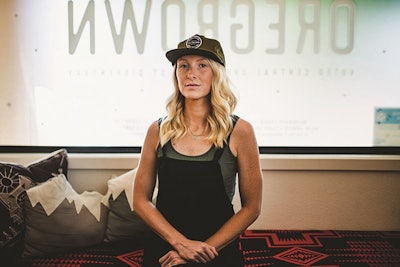
When Chrissy and Aviv Hadar, co-founders of Oregrown, began considering ways to stand out in a crowded Oregon cannabis marketplace, they landed on a natural fit that blended their existing customer base with a vision for growth: athlete sponsorships.
The move conveyed a broader message of support for cannabis use in professional and amateur sports, and it netted Oregrown a clear brand that customers associated with the outdoorsy, active lifestyle that they already enjoyed.
And that’s just the most visible example of Oregrown’s marketing acumen—one we’ve written about for a Cannabis Dispensary cover story. There’s much more, and Chrissy will be talking about that at Cannabis Conference 2019. Here, she offers a preview of the methodology behind good marketing strategies in the cannabis space.
Cannabis Dispensary: What sort of environment is needed to cultivate good marketing ideas—are there specific internal processes, a specific position or hire?
Chrissy Hadar: Here at Oregrown, we do all of our marketing and branding in-house, and a lot of it originates from our co-founders. So, that would be my husband and myself, and we have a great marketing team that we filled out underneath us over the past few years that kind of helps us hone in on the brand. When it comes to marketing, the best ideas come from the most casual situations.
I think if you sit down with an idea that you're going to come out of this exercise with this great marketing idea, it’s probably not going to happen. The best ideas that have come out of Oregrown have just been from free-flowing discussions, where we're talking about the brand and what it means to each of us. I also think it's really important to bring in on a regular basis a fresh set of eyes.
With that, you get other people's perspectives on the brand. You know how you view your brand and who your customer is, but how does that customer—people outside of that fishbowl—view your brand? And I think by taking into account their story of how they view your brand, you're able to kind of naturally push your brand forward and offer a new content and perspective.
CD: Of course, that leaves the door wide open for creativity and experimentation—and some things stick and some things don't. When you do implement a marketing campaign, how do you know when it's not working, when it's time to just pull back and start from scratch?
CH: I think if an idea doesn't excite you from the beginning, you shouldn't do it.
A lot of ideas come across our table. And I think that they're good ideas, but if they don't excite me, like I immediately want to jump up and get to work, then it's probably not a good idea.
I think with anything you do in business, you have to go into it with a goal in mind—and there’s a short-term goal or long-term goal when it comes to any sort of marketing that you do. And you have to have a good idea of how you're going to measure the return on your investment going into it.
With that said, if you have a great marketing idea and you roll it out and you execute it to the best of your ability, and it isn't checking off the boxes of the goals that you initially set before going into the project, it's probably time to pivot and move on from that idea and try something else.
CD: In terms of marketing and customer engagement, how has your athlete sponsorship marketing work changed the conversation with customers, or how has that changed customer demands and buying trends?
CH: Out intention going into the athlete program was to normalize cannabis—and not just for recreational use, but for recovery.
Our athletes are out there talking about cannabis, whether it be CBD or THC, showing that it can be a great addition to a healthy lifestyle. And so, I think a lot of the people that come into our store—being that we live in a mountain town, a tourist attraction, due our outdoor sports—people come in looking for something to help them recover from athletic injuries or just a rough day down the mountain. I think it makes it more accessible.
And it's just a really good reflection on the brand. The people that are coming into our store are good stewards of the communities that are out there doing things; they are not what people think of as your stereotypical stoner, and I think that really resonates with the community here in central Oregon.


























